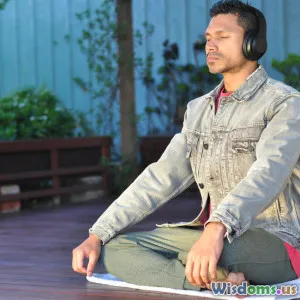
What I Learned From 30 Days of Complete Digital Detox
8 min read Discover transformative insights from a 30-day digital detox that deepened my spirituality and reshaped my philosophy on modern life. (0 Reviews)
What I Learned From 30 Days of Complete Digital Detox
Introduction: Disconnecting to Reconnect
In our hyper-connected era, digital devices act not just as tools but as extensions of ourselves. The constant ping of notifications, endless scrolling, and insistent digital presence fragment our attention and often enslave our focus. But what happens when you hit pause on all digital stimuli for an entire month? I embarked on a 30-day complete digital detox, stepping away from phones, computers, social media, and all digital distractions to explore the spiritual and philosophical impact on my life. This was no mere experiment in forced isolation; it was a deliberate plunge into stillness, presence, and self-reflection.
Throughout this journey, I uncovered surprising lessons that challenged my perceptions of time, suffering, and connection, illuminating the path toward a more mindful and meaningful life.
The Catalyst: Why I Chose a Digital Detox
The decision came after several months of feeling mentally restless yet paradoxically numb. Despite constant digital engagement, true connection to myself and those around me seemed absent. Studies underscore this experience: according to a 2023 study by the Pew Research Center, 72% of individuals report feelings of anxiety or stress linked to social media use. The endless digital consumption was contributing to spiritual disquiet—an uneasy disconnect between who I was online and offline.
It's worth noting philosopher Byung-Chul Han’s critique of the 'society of tiredness' in his book The Burnout Society (2015), where constant digital overstimulation pigeonholes our consciousness into a perpetual state of distraction, anxiety, and burnout. His insights motivated my choice to unplug completely and regain clarity.
Body
Reclaiming Time: From Overload to Stillness
One of the earliest stark realizations was how much of my “free time” was actually hijacked by digital content. According to RescueTime data, the average person spends nearly 3 hours and 43 minutes daily on mobile devices. Over 30 days, that’s almost 112 hours—more than four full days lost to screen time.
Without digital distractions, the relentless flow of time slowed dramatically. Mornings became sacred rituals of reading philosophy and meditating rather than rushing through emails. Time expanded into pockets where mindful contemplation flourished. The philosopher John Locke’s reflections on the concept of ‘duration’ resonated strongly: it is in the quality and awareness of our moments that true existence is felt, not just endless accumulation of tasks.
Example: I replaced my habitual phone-checking habit immediately upon waking with a ten-minute meditation session focused on breath awareness. This not only grounded me but enlightened me to the mindful luxury of simply being.
Facing the Silence: Spiritual Confrontations
Silence can be daunting, especially when paired with the absence of constant digital noise. Yet within this silence, an unexpected spiritual richness emerged.
Without the usual distractions, unresolved anxieties, fears, and existential questions surfaced. This echoed philosopher Søren Kierkegaard’s notion that true self-understanding requires wresting with angst and solitude. Instead of numbing these feelings with scrolling feeds, I leaned in consciously.
By journaling these confrontations, over time a subtle transformation took shape—a shift towards acceptance and profound interconnectedness with existence itself.
Notably, traditional spiritual practices from Zen Buddhism emphasize this use of silence to 'empty the mind' and foster satori, or awakening moments. I experienced mini-awakenings, fleeting glimpses of clarity and peace.
Reassessing Relationships: Presence Over Perfomance
Digital communication breeds a performative culture where 'likes' and comments often substitute for genuine interactions. Throughout the detox, I noticed a rebalancing of relationships. Conversations became deeper and richer when freed from the distraction of checking a screen every few minutes.
For example, during family gatherings, I intentionally listened fully, observing nonverbal cues and emotional tones which usually slip past unnoticed during distracted phone use. This practice echoed the teachings of philosopher Emmanuel Levinas, who championed the ethical imperative of truly encountering the other face-to-face.
My relationships evolved from transactional digital acknowledgments to profound empathetic engagements.
The Philosophy of Tech Symbiosis: Not Just Black and White
After 30 days, it became clear the aim isn’t to demonize technology, but to cultivate a balanced, harmonious relationship. Technology itself is neither inherently good nor bad—it amplifies what we direct it toward. The key insight drawn from St. Augustine’s skepticism about external distractions blocking true freedom was relevant: freedom emerges from mastery over rather than subjugation to our tools.
I devised a balanced digital philosophy:
- Use technology as a servant, not a master
- Bring awareness to digital habits
- Schedule tech-free periods regularly for spiritual and mental health
This middle path reflects the ancient Aristotelian concept of the “Golden Mean” — the virtuous balance between excess and deficiency.
Conclusion: Cultivating Mindful Presence Beyond Screens
My 30-day digital detox did more than reduce screen time—it precipitated an important spiritual recalibration. By reclaiming time, embracing silence, deepening interpersonal presence, and philosophically reconsidering technology’s role, I discovered thriving spiritual potential in today’s digital age.
This experiment reinforced a timeless truth echoed across spiritual traditions: the path to genuine self-awareness and peace requires deliberate unplugging from external noise and tuning in to our inner rhythms.
For those feeling overwhelmed by digital storms, consider starting with small detox windows and observe how mindfulness blossoms with presence. As Jiddu Krishnamurti wisely said, "In the silence between thoughts lies the light of truth."
Perhaps, the silence freed by a digital detox invites us back to that light—inviting a richer, more intentional way of living and connecting.
References & Further Reading:
- Byung-Chul Han, The Burnout Society, 2015
- Pew Research Center, Social Media Use in 2023
- Søren Kierkegaard, The Concept of Anxiety, 1844
- Emmanuel Levinas, Totality and Infinity, 1961
- John Locke, An Essay Concerning Human Understanding, 1689
- Jiddu Krishnamurti Quotes
Embark on your own digital detox journey and discover the spiritual stillness waiting just beyond the screen.
Rate the Post
User Reviews
Popular Posts





















